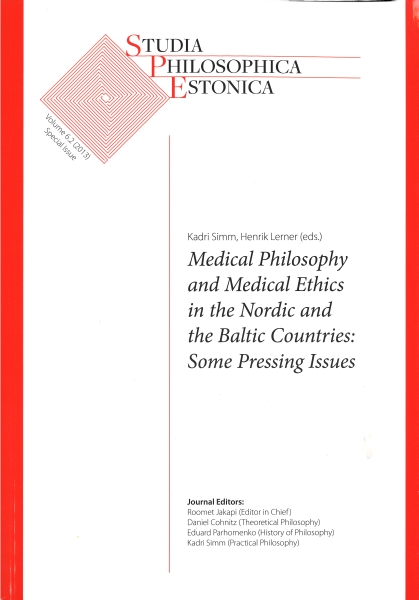Relational Truth-creation: Between Bare Literal Openness and Mutual Manipulation
DOI:
https://doi.org/10.12697/spe.2013.6.2.04Keywords:
truth, correspondence theory of truth, constructivist theory of truth, patient-physician-relationship, doctor-patient-communication, professional ethics, informed consent, hermeneuticsAbstract
The intention of this article is to highlight some aspects that question a simplistic idea of truth as corresponding to the facts that is often implied in the imperative "Tell the truth!": the epistemological status of the biomedical information, the choice and development of relevant information, and the complicated process of adjusting two different ways of explanations with the actual state of affairs. Telling the truth is a delicate and complicated process, the more if it is embedded in other communicational tasks like therapy and diagnosis. It requires a successive development of mutual understanding, and it has educative and insofar also possibly manipulative aspects, that may on the first view contradict the guiding imperative. Thus, truth-telling is not translating a medical checklist to everyday language, but requires hermeneutic as well as constructive capacities from both, sender and receiver of the information.
Downloads
References
Aquinas, T. (1265-1274). Summa Theologica.
Aristotle (2009). Metaphysics, NuVision Publications, Sioux Falls.
Beauchamp, T. and Childress, J. (2009). Principles of Biomedical Ethics, 6th edn, Oxford University Press, New York.
Cassell, E. (1991). The Nature of Suffering and the Goals of Medicine, Oxford University Press, Oxford.
Chalmers, A. (1982). What Is This Thing Called Science?, 2nd edn, Queensland University Press, St. Lucia.
Emanuel, E. and Emanuel, L. (1992). Four models of the physician patient-relationship, Journal of the American Medical Association 267: 2221-2226.
Faden, R. and Beauchamp, T. (1986). A History and Theory of Informed Consent, Oxford University Press, New York.
Gelhaus, P. (2009). Der Mensch als Gen-Maschine: Reichweite und Geschichte einer Metapher, Zeitschrift für Semiotik 31: 397-410.
Gelhaus, P. (2012). The desired moral attitude of the physician: (i) empathy, Medicine, Health Care and Philosophy 15: 103-113.
Jaarsma, P., Gelhaus, P. and Welin, S. (2012). Living the categorical imperative: Autistic perspectives on lying and truth-telling–Between Kant and care ethics, Medicine, Health Care and Philosophy 15: 271-277.
Popper, K. (1934). The Logic of Scientific Discovery, Routledge Classics, London.
von Glasersfeld, E. (1996). Der radikale Konstruktivismus, Suhrkamp, Frankfurt am Main.
Wear, S. (1993). Informed Consent. Patient Autonomy and Physician Beneficence within Clinical Medicine, Kluwer, Dordrecht.

